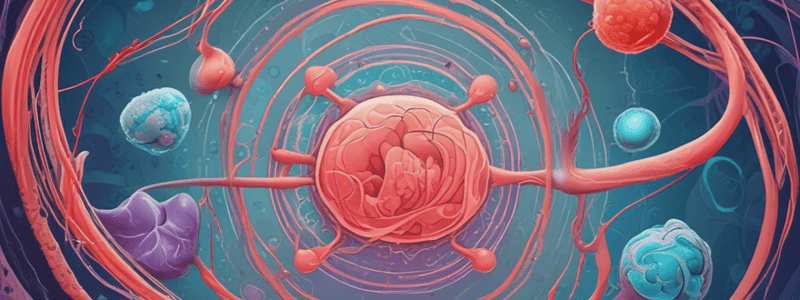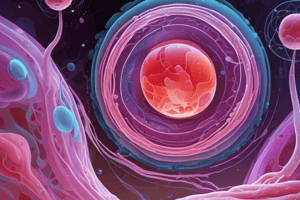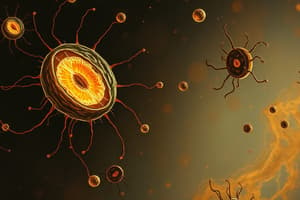Podcast
Questions and Answers
Where are some cells trapped during the two migration waves?
Where are some cells trapped during the two migration waves?
- Dental pulp
- Bone marrow
- Wharton's jelly (correct)
- Amniotic fluid
What is a characteristic of Umbilical Cord Blood MSCs?
What is a characteristic of Umbilical Cord Blood MSCs?
- Lower proliferative potential than BM-MSCs
- Higher telomerase activity (correct)
- Lower differentiation potential
- Higher tumorigenicity
What is a feature of Amniotic Fluid Stem Cells?
What is a feature of Amniotic Fluid Stem Cells?
- Lower proliferation rate
- Homogeneous population
- Low immunomodulatory activity
- Heterogeneous population (correct)
What is the origin of Dental Mesenchymal Stem Cells?
What is the origin of Dental Mesenchymal Stem Cells?
Which of the following is a type of Dental Stem Cells?
Which of the following is a type of Dental Stem Cells?
What is a characteristic of Cancer Stem Cells?
What is a characteristic of Cancer Stem Cells?
What is a use of Dental Stem Cells?
What is a use of Dental Stem Cells?
What is a feature of Umbilical Cord Blood MSCs compared to BM-MSCs?
What is a feature of Umbilical Cord Blood MSCs compared to BM-MSCs?
What is the primary characteristic of a stem cell?
What is the primary characteristic of a stem cell?
What is the main difference between embryonic and adult stem cells?
What is the main difference between embryonic and adult stem cells?
What is a progenitor cell?
What is a progenitor cell?
What is a characteristic of pluripotent stem cells?
What is a characteristic of pluripotent stem cells?
What is a characteristic of embryonic stem cells?
What is a characteristic of embryonic stem cells?
What is a characteristic of induced pluripotent stem cells (iPSCs)?
What is a characteristic of induced pluripotent stem cells (iPSCs)?
What is a characteristic of multipotent stem cells?
What is a characteristic of multipotent stem cells?
What is a characteristic of unipotent stem cells?
What is a characteristic of unipotent stem cells?
What is the minimum percentage of surface antigens required for a cell to be considered a Mesenchymal Stem Cell (MSC) according to the International Society of Cellular Transplant (ISCT)?
What is the minimum percentage of surface antigens required for a cell to be considered a Mesenchymal Stem Cell (MSC) according to the International Society of Cellular Transplant (ISCT)?
Which of the following is NOT a characteristic of Mesenchymal Stem Cells (MSCs)?
Which of the following is NOT a characteristic of Mesenchymal Stem Cells (MSCs)?
What is the primary cell population found in Umbilical Cord Blood (UCB)?
What is the primary cell population found in Umbilical Cord Blood (UCB)?
Which of the following is a characteristic of Hematopoietic Stem Cells (HSCs)?
Which of the following is a characteristic of Hematopoietic Stem Cells (HSCs)?
What is the location of Hematopoietic Stem and Progenitor Cells (HSPCs)?
What is the location of Hematopoietic Stem and Progenitor Cells (HSPCs)?
What is the characteristic of Adipose-Derived Stem Cells (ADSCs) in large blood vessels?
What is the characteristic of Adipose-Derived Stem Cells (ADSCs) in large blood vessels?
Why are Umbilical Cord Blood (UCB) cells considered low immunogenic?
Why are Umbilical Cord Blood (UCB) cells considered low immunogenic?
During embryogenesis, where do Hematopoietic Stem Cells (HSCs) and Mesenchymal Stem Cells (MSCs) migrate from?
During embryogenesis, where do Hematopoietic Stem Cells (HSCs) and Mesenchymal Stem Cells (MSCs) migrate from?
What are the four Yamanaka factors used to reprogram adult cells into induced pluripotent stem cells?
What are the four Yamanaka factors used to reprogram adult cells into induced pluripotent stem cells?
What is the primary function of c-Myc in the Yamanaka factors?
What is the primary function of c-Myc in the Yamanaka factors?
What is the term for stem cells that are not embryonic stem cells?
What is the term for stem cells that are not embryonic stem cells?
What is the primary characteristic of adult stem cells?
What is the primary characteristic of adult stem cells?
What is the origin of hematopoietic stem cells?
What is the origin of hematopoietic stem cells?
Where can mesenchymal stem cells be found?
Where can mesenchymal stem cells be found?
What is the function of mesenchymal stem cells in terms of immune regulation?
What is the function of mesenchymal stem cells in terms of immune regulation?
What is the potential of mesenchymal stem cells in terms of differentiation?
What is the potential of mesenchymal stem cells in terms of differentiation?
Flashcards are hidden until you start studying
Study Notes
Stem Cells
- Stem cells are unspecialized cells with the capacity for self-renewal, asymmetric division, and transformation into other mature cell types.
- They can be classified into embryonic stem cells, adult stem cells, and induced pluripotent stem cells.
Embryonic Stem Cells
- Derived from the inner cell mass of developing blastocysts.
- Pluripotent stem cells, capable of differentiating into all three germ layers: ectoderm, endoderm, and mesoderm.
- Self-renewal in-vivo and in-vitro.
- Pluripotency stem cell markers include OCT3/4, Nanog, Sox2, SSEA4, TRA1-81, and TRA1-60.
- Can form teratomas, which are tumors that contain cells from all three germ layers.
Adult Stem Cells
- Also referred to as somatic stem cells.
- Not entirely "adult," but rather "post-embryonic" stem cells.
- Mostly multipotent, rather than pluripotent.
- Limited differentiation potential.
- Capacity for self-renewal.
- Examples include hematopoietic stem cells (HSCs) and mesenchymal stem cells (MSCs).
Mesenchymal Stem Cells
- Multipotent stem cells.
- Traditionally found in red bone marrow (stromal MSC).
- Can be isolated from other tissues, such as adipose tissue, peripheral blood, umbilical cord blood, and dental tissues.
- Differentiation potential includes adipocytes, chondrocytes, tenocytes, osteocytes, and myocytes.
- Surface antigens according to the International Society of Cellular Transplant (ISCT) include CD105, CD73, CD90, and CD45.
- Can be isolated using affinity for plastic adherence.
- Easy in-vitro expansion.
- High plasticity.
- Immune privileged.
- Immunomodulatory effects via cytokine secretion.
Hematopoietic Stem Cells
- Multipotent stem cells.
- Derived from mesoderm.
- Able to give rise to all blood cells (lymphoid, myeloid).
- Located in adult bone marrow, peripheral blood, and umbilical cord blood.
- Limited transdifferentiation potential (muscle, liver, bone).
Induced Pluripotent Stem Cells
- Genetically modified adult cells to resemble embryonic-like stem cells.
- May substitute for embryonic stem cells.
- Discovered in 2006 by Prof. Yamanaka and Takahashi, Nobel Prize.
- Potential for mutagenesis.
- Yamanaka factors include Oct4, Sox2, Klf4, and c-Myc.
- Highly expressed in embryonic stem cells.
- Developmental signaling network of embryonic stem cells.
- Determinant of embryonic stem cell pluripotency.
Umbilical Cord Blood
- Primary cell population includes lymphocytes and monocytes.
- Higher natural killer (NK) population.
- Lower T-lymphocyte population.
- Higher proportion of immature T-lymphocytes.
- Lower absolute numbers of cytokines.
- Presumption: higher ratio of anti- vs. pro-inflammatory cytokines.
- Low immunogenic cells.
- HSCs and MSCs migrate from the yolk sac and aorta-gonad-mesonephros to the placenta and then back to the fetal liver and bone marrow through the umbilical cord.
Other Stem Cells
- Dental mesenchymal stem cells: originate from ectomesenchyme and neural crest, with high neural regenerative potential and neurotrophic factor secretion.
- Amniotic fluid stem cells: likely released from fetal amniotic membrane, embryonic skin, digestive tract, and the respiratory and urogenital systems, with heterogeneous population, pluripotent markers, and MSC features.
- Cancer stem cells: tumorigenic, with similar characteristics to normal stem cells, including self-renewal and asymmetric division.
Studying That Suits You
Use AI to generate personalized quizzes and flashcards to suit your learning preferences.




